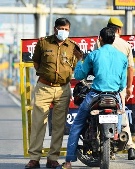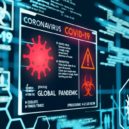LAW ENFORCEMENT DURING A PANDEMIC

A law and order bundobust can get schemed and is, to a large extent, predictable, but a pandemic is entirely unpredictable. None or few people or few hundreds may die during a law and order situation, but thousands or millions could die in a pandemic. The worst flu pandemic in contemporary history was the “Spanish flu” of 1918–19, which exterminated 50 million people worldwide. A pandemic is a public health problem. Why would it be a police problem? Whenever anything unpleasant happens, who do people reach out to? The local public health officer? Few know the number of the public health department, but most of them know how to get in touch with the police. A pandemic becomes a police dilemma because during pandemics police besides enforcement of the law would be expected to enforce public health orders such as quarantines, closure of establishments, travel restrictions etc. They would also be needed to secure the perimeter of contaminated areas, obtain health care facilities, control crowds, investigate any infraction of social distancing protocols, investigate escape of infected victims from quarantines, act on rumour mongers, and provide security to hospitals and medical supplies.
 Planning for a pandemic or any other public health emergency is like any law and order problem or a major bandobast. Both deal with containment and prevention of spread and protection of the people. The main difference being that a law and order problem is local while a pandemic is global. In a typical law and order situation if the situation worsens it would be possible to augment the deployment but as a pandemic involves a nation in entirety and as the pandemic would, also take its toll of police personnel- There is no way to predict how it will unfold. We can prepare a bandobast scheme for law and order situations, but nobody has any clue how the contagion will tear through the population to visualise and outline a bandobast scheme. A pandemic would be more challenging than a worst law and order situation as the police would have to deal with a public health emergency with a workforce that is depleting by the day and with fresh challenges mounting by the day. Keeping this in mind, the police leadership would have to prepare for the maintenance of law and order with minimum deployment for long periods. As the pandemic influenza comes in waves, each lasting approximately eight weeks, the police leaders would have to assess, rework the plan and course correct to address the waves as and when they emerge.
Planning for a pandemic or any other public health emergency is like any law and order problem or a major bandobast. Both deal with containment and prevention of spread and protection of the people. The main difference being that a law and order problem is local while a pandemic is global. In a typical law and order situation if the situation worsens it would be possible to augment the deployment but as a pandemic involves a nation in entirety and as the pandemic would, also take its toll of police personnel- There is no way to predict how it will unfold. We can prepare a bandobast scheme for law and order situations, but nobody has any clue how the contagion will tear through the population to visualise and outline a bandobast scheme. A pandemic would be more challenging than a worst law and order situation as the police would have to deal with a public health emergency with a workforce that is depleting by the day and with fresh challenges mounting by the day. Keeping this in mind, the police leadership would have to prepare for the maintenance of law and order with minimum deployment for long periods. As the pandemic influenza comes in waves, each lasting approximately eight weeks, the police leaders would have to assess, rework the plan and course correct to address the waves as and when they emerge.
In a pandemic situation, there would be a need for the police to coordinate its response rapidly with public health and medical officials, many of whom they would not have interacted with previously. Hence, states while formulating pandemic plans should assign specific roles for police. Most times, the plans merely mention that police will carry out their usual duties, aiding and bolstering other agencies where possible. Such lack of specificity could mean police response can be flexible, or that their role could change over a period of time. Vague and ambiguously defined roles could translate into unimaginable expectations from the public, which could throw the police into an overwhelm. In the thick of a pandemic, police would be compelled to engage with the public health officials on wide-ranging matters and lack of clarity of police role during such occasions could give rise to turf wars.
 Knowing well that law enforcement resources during a pandemic may get overwhelmed, police may have to take steps to balance law and order responsibilities with recently added public health obligations. All of which police may have to achieve with a diminished workforce as police personnel and their family members could get infected and get unwell. Police organisations may, therefore, have to prepare a plan which readies the department to meet the eventuality, a plan which protects police personnel through the creation of awareness and training along with a plan to protect the community which is maintaining public order during the crisis.
Knowing well that law enforcement resources during a pandemic may get overwhelmed, police may have to take steps to balance law and order responsibilities with recently added public health obligations. All of which police may have to achieve with a diminished workforce as police personnel and their family members could get infected and get unwell. Police organisations may, therefore, have to prepare a plan which readies the department to meet the eventuality, a plan which protects police personnel through the creation of awareness and training along with a plan to protect the community which is maintaining public order during the crisis.
During a pandemic, it may become incumbent upon the police to do many things in different ways to beat the contagion. Police would be required to maintain absolute hygiene in the police station premises by extra cleaning. As the infection spreads, the police may see their ranks getting sick. Hence police may have to cut access to police stations and handle complaints safely. A pandemic may require the police to think differently. It may require the police to restrict access of members of the public to police stations by encouraging them to prefer complaints through social media platforms such as WhatsApp calls or Facebook posts or phone calls. Police may have to take a call to act only on serious offences by taking necessary precautions while deferring action on less severe offences after recording the same. During a pandemic, police should stop arresting people for minor crimes as police would have to shift resources and adjust priorities to maintain law and order while doing their best to prevent infection among police personnel and suspects. The idea behind it being to minimise the number of arrests and thereby minimise the risk to the police personnel. The police may expose themselves to the risk of infection in the process of an arrest, in transporting an arrestee and in bringing them to a police station. It may be better for the police to not enforce the local and special laws such as offences against gambling, illegal lotteries, gutkha, and other petty offences as this would amount to inviting trouble into the police stations by way of infection. Police may have to do some out of the box thinking, rely more on spot fines, discretionary powers and other modes of criminal action or disposal. Police while effecting arrests should wear prescribed Police Protection Equipment (PPE) and produce the arrested persons before a doctor before bringing them into the premises of a police station for recording the arrest. While imposing the Janata curfew, police had to face some unforeseen challenges as some tea shops and mutton shops wanted to keep their shops open, because the shopkeepers felt that their freedom was being curtailed. The shop keepers resented the police and were sceptical of the curfew’s value.
 Many policing tasks raise the risk of infection. Breathalysers are a case in point. In the districts that come under me, I have got all the breathalysers withdrawn and got them centrally deposited after proper sterilisation to prevent them from being used. Government has done well by ordering the closure of all watering holes like pubs, clubs and bars. It would be a good idea to get all the TASMAC shops closed as well. When the sale of liquor gets shut down completely, there would be no necessity for police to deal with breathalysers and drunken driving offences. This one step alone could go a long way in minimising infection.
Many policing tasks raise the risk of infection. Breathalysers are a case in point. In the districts that come under me, I have got all the breathalysers withdrawn and got them centrally deposited after proper sterilisation to prevent them from being used. Government has done well by ordering the closure of all watering holes like pubs, clubs and bars. It would be a good idea to get all the TASMAC shops closed as well. When the sale of liquor gets shut down completely, there would be no necessity for police to deal with breathalysers and drunken driving offences. This one step alone could go a long way in minimising infection.
During a pandemic, it would be better if the traffic police refrained from booking routine traffic violations and instead concentrated on ensuring the unhindered movement of ambulances and arranging vehicles for the transport of sick to hospitals and quarantine centres. We may have to draft the traffic police and police from neighbourhood police stations for “high-visibility patrols” to reassure the anxious public and to regulate queues as some businesses would close their doors and grocery stores could attract long lines. As the pandemic progresses, the police may also become involved in transporting very sick and dead to the hospital. Police may also get asked to transport medical equipment, supplies, and pharmaceutical samples. Knowing how to transport these items safely is essential and failing to do this correctly might itself increase the risk of infection. Policing protocols during pandemics, therefore, would depend on the cause and level of the threat, and the potential risk to the responding police personnel.
 Nature of the police job requires frequent and close contact with the public, which makes it extremely challenging for the police to practice social distancing. Police belong to the society and come from the same community hence infection among the police is likely to be as high as within the society. As police have the most significant engagement with the community, the frontline officers could suffer from disproportionately higher infection causing high absenteeism due to more exposure to the virus than others. Which is why, police may have to game out scenarios where about 50 percent of the workforce is unavailable because of illness.
Nature of the police job requires frequent and close contact with the public, which makes it extremely challenging for the police to practice social distancing. Police belong to the society and come from the same community hence infection among the police is likely to be as high as within the society. As police have the most significant engagement with the community, the frontline officers could suffer from disproportionately higher infection causing high absenteeism due to more exposure to the virus than others. Which is why, police may have to game out scenarios where about 50 percent of the workforce is unavailable because of illness.
During an outbreak like COVID-19, we must permit no police personnel to work while sick, as contagious diseases can spread quickly through an organisation and most preventive measures are not effective in a work environment. Coronavirus spreads through the air, through hand contact, and on environmental surfaces. A few police personnel working for a few hours while sick can pass the disease to many others. Soon, a significant proportion of the department and population in the station limits could be sick, too.
Quarantine and curfew may reduce crime, but pandemics often end up providing opportunities for new types of crimes. Quacks who promise miraculous cures surface, and rumour-mongers work overtime to create panic and anxiety in the minds of the people. As social distancing and isolation would require people to stay at home, this would bring opportunities for criminals to target and loot empty shops and factories in the streets. As families are forced to stay at home, there is a likelihood of an increase in cases of domestic violence because of a prolonged interaction between spouses bringing out old resentments and hurt feelings of the past leading to arguments and eventually to aggression. And out in the streets, there could be violence and protests because of scarcities of food and medical supplies brought about by pandemics. Police would, therefore, have to devise strategies and new approaches to deal with it.
 During a pandemic, police may also have to manage the concerns of the population they are policing by devising public communication strategies. Police may have to invite public health officials to address the residents through local television channels and radio in which local police DSPs or Inspectors could share their plans and preparations to face the pandemic. It’s a good idea for the police to consider collaboration with local chambers of commerce, religious heads, and heads of local educational institutions. Enlisting local volunteers such as the Friends of Police and NGOs to chip in to render help in disseminating information and extending help could also prove valuable.
During a pandemic, police may also have to manage the concerns of the population they are policing by devising public communication strategies. Police may have to invite public health officials to address the residents through local television channels and radio in which local police DSPs or Inspectors could share their plans and preparations to face the pandemic. It’s a good idea for the police to consider collaboration with local chambers of commerce, religious heads, and heads of local educational institutions. Enlisting local volunteers such as the Friends of Police and NGOs to chip in to render help in disseminating information and extending help could also prove valuable.
The coronavirus has unleashed enormous fear, panic and uncertainty in the minds of the people. In the present times, mere contemplation on the statement that -“We are not human beings having a spiritual experience but that we are spiritual beings having a human experience” can provide immense solace and peace. Fear and insecurity vanish when we let our perspective shift from ego to spirit. All the gloom and despair cast by the pandemic can get dispelled when we realise that we are eternal and infinite souls.
Source from: epaper/deccanchronicle/chennai/dt:23.03.2020
 Dr.K. Jayanth Murali is an IPS Officer belonging to 1991 batch. He is borne on Tamil Nadu cadre. He lives with his family in Chennai, India. He is currently serving the Government of Tamil Nadu as Additional Director General of Police, Law and Order.
Dr.K. Jayanth Murali is an IPS Officer belonging to 1991 batch. He is borne on Tamil Nadu cadre. He lives with his family in Chennai, India. He is currently serving the Government of Tamil Nadu as Additional Director General of Police, Law and Order.



Apr 7, 2020 at 6:15 PM /
The job of police is really the toughest of all professions. But they are they are the most required . In fact I can call them next to God to protect the People at all times. I laud their services to the nation !